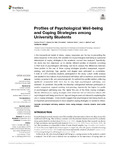Mostrar o rexistro simple do ítem
Profiles of psychological well-being and coping strategies among university students
| dc.contributor.author | Freire, Carlos | |
| dc.contributor.author | Ferradás, María del Mar | |
| dc.contributor.author | Valle, Antonio | |
| dc.contributor.author | Núñez, José Carlos | |
| dc.contributor.author | Vallejo, Guillermo | |
| dc.date.accessioned | 2024-01-19T09:01:00Z | |
| dc.date.available | 2024-01-19T09:01:00Z | |
| dc.date.issued | 2016-10-13 | |
| dc.identifier.citation | Freire, C., Ferradás, M. M., Valle, A., Núñez, J. C., and Vallejo, G. (2016). Profiles of Psychological Well-being and Coping Strategies among University Students. Frontiers in Psychology, 7, Article1554. https://doi.org/10.3389/fpsyg.2016.01554 | es_ES |
| dc.identifier.uri | http://hdl.handle.net/2183/35001 | |
| dc.description.abstract | [Abstract] In the transactional model of stress, coping responses are the key to preventing the stress response. In this study,the possible role o fpsychological well-being as a personal determinant of coping strategies in th eacademic context wa sanalyzed. Specifically, the study has two objectives: (a) to identify different profiles of students according to their level of psychological well-being; and (b) to analyze the differences between these profiles in the use of three coping strategies (positive reappraisal, supportseeking, and planning). Age, gender, and degree were estimated as covariables. A total of 1,072 university students participated in the study. Latent profile analysis was applied to four indices of psychologica lwell-being: self-acceptance, environmental mastery, purpose in life, and personal growth. An optimal four-profile solution, reflecting significant incremental shifts from low to very high psychological well-being, was obtained. As predicted, the profile membership distinguished between participants in positive reappraisal, support-seeking, and planning. Importantly, the higher the profile of psychological well-being was, the higher the use of the three coping strategies. Gender differences in coping strategies were observed, but no interaction effects with psychological well-being were found. Age and degree were not relevant in explaining the use of coping strategies.These results suggest that psychological well-being stands as an important personal resource to favor adaptive coping strategies for academic stress. | es_ES |
| dc.language.iso | eng | es_ES |
| dc.publisher | Frontiers Media | es_ES |
| dc.relation.uri | https://doi.org/10.3389/fpsyg.2016.01554 | es_ES |
| dc.rights | CC-BY | es_ES |
| dc.rights.uri | http://creativecommons.org/licenses/by-nc-nd/3.0/es/ | * |
| dc.subject | Psychological well-being | es_ES |
| dc.subject | Academic stress | es_ES |
| dc.subject | Coping strategies | es_ES |
| dc.subject | University students | es_ES |
| dc.subject | Latent profle analysis | es_ES |
| dc.title | Profiles of psychological well-being and coping strategies among university students | es_ES |
| dc.type | info:eu-repo/semantics/article | es_ES |
| dc.rights.access | info:eu-repo/semantics/openAccess | es_ES |
| UDC.journalTitle | Frontiers in Psychology | es_ES |
| UDC.volume | 7 | es_ES |
| UDC.issue | 1554 | es_ES |
Ficheiros no ítem
Este ítem aparece na(s) seguinte(s) colección(s)
-
GI-GIPED - Artigos [69]






